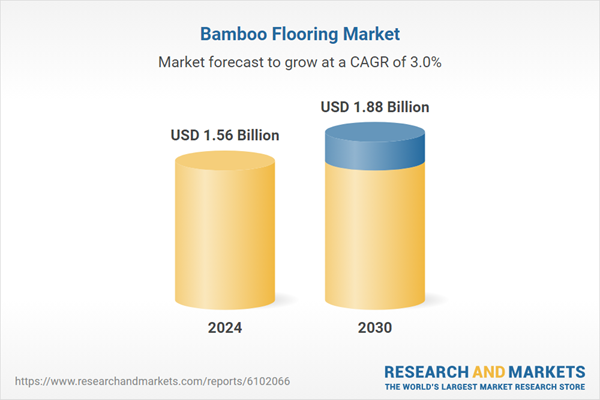Speak directly to the analyst to clarify any post sales queries you may have.
10% Free customizationThis report comes with 10% free customization, enabling you to add data that meets your specific business needs.
Key Market Drivers
Escalating Demand for Sustainable and Eco-Friendly Building Materials
The increasing global emphasis on environmental sustainability is propelling demand for bamboo as a renewable building material. Bamboo regenerates within five years and does not require replanting, making it a highly sustainable option compared to traditional hardwoods. This aligns well with green building standards such as LEED and BREEAM, which emphasize low carbon and resource-efficient materials. Governments and developers worldwide are investing in sustainable infrastructure, while consumers are showing a growing preference for eco-labeled products. Certified bamboo flooring options that meet FSC or PEFC standards are seeing increased demand, particularly in markets driven by climate-conscious construction practices and incentive-based green policies.Key Market Challenges
Inconsistent Quality and Standardization Across Regions
The bamboo flooring industry faces a persistent challenge in ensuring product consistency and quality control across different production regions. Natural variability in bamboo species, harvesting cycles, and regional processing techniques often lead to inconsistencies in the final product's hardness, color, stability, and resistance properties. Variations in adhesive formulations, carbonization levels, and finishing methods further complicate quality assurance, especially in international markets lacking unified standards. These inconsistencies can impact consumer trust and hinder the broader adoption of bamboo flooring, particularly in large-scale construction projects that require uniform specifications and long-term performance guarantees.Key Market Trends
Sustainability-Driven Innovation in Manufacturing and Product Quality
The bamboo flooring market is increasingly embracing sustainable innovation in both manufacturing techniques and material inputs. Manufacturers are investing in non-toxic binders, formaldehyde-free finishes, and strand-woven construction to improve performance and reduce environmental impact. Precision manufacturing technologies, including CNC milling and UV-cured coating systems, are enhancing product quality by improving scratch resistance, moisture tolerance, and design accuracy. Additionally, digital printing is allowing bamboo flooring to replicate the appearance of high-end wood species, expanding its appeal in modern interior design. As closed-loop recycling systems and reclaimed bamboo inputs gain traction, the market continues to shift toward circular production models that align with green building certifications and sustainable procurement mandates.Key Market Players
- MOSO International B.V.
- Cali Bamboo LLC
- Teragren LLC
- Smith & Fong Company
- Home Legend, LLC
- Kahrs Holding AB
- Floor & Decor Holdings, Inc.
- Ambient Bamboo Floors, Inc.
- Bamboo Hardwoods, Inc.
- Eco Bamboo & Wood, S.L.
Report Scope:
In this report, the Global Bamboo Flooring Market has been segmented into the following categories, in addition to the industry trends which have also been detailed below:Bamboo Flooring Market, By Type:
- Solid Bamboo Floor
- Engineered Bamboo Floor
- Strand Woven Bamboo Floor
- Others
Bamboo Flooring Market, By Application:
- Commercial
- Residential
Bamboo Flooring Market, By Region:
- North America
- United States
- Canada
- Mexico
- Europe
- France
- United Kingdom
- Italy
- Germany
- Spain
- Asia-Pacific
- China
- India
- Japan
- Australia
- South Korea
- South America
- Brazil
- Argentina
- Colombia
- Middle East & Africa
- South Africa
- Saudi Arabia
- UAE
- Kuwait
- Turkey
Competitive Landscape
Company Profiles: Detailed analysis of the major companies present in the Global Bamboo Flooring Market.Available Customizations:
With the given market data, the publisher offers customizations according to a company's specific needs. The following customization options are available for the report.Company Information
- Detailed analysis and profiling of additional Market players (up to five).
This product will be delivered within 1-3 business days.
Table of Contents
Companies Mentioned
- MOSO International B.V.
- Cali Bamboo LLC
- Teragren LLC
- Smith & Fong Company
- Home Legend, LLC
- Kahrs Holding AB
- Floor & Decor Holdings, Inc.
- Ambient Bamboo Floors, Inc.
- Bamboo Hardwoods, Inc.
- Eco Bamboo & Wood, S.L.
Table Information
| Report Attribute | Details |
|---|---|
| No. of Pages | 180 |
| Published | June 2025 |
| Forecast Period | 2024 - 2030 |
| Estimated Market Value ( USD | $ 1.56 Billion |
| Forecasted Market Value ( USD | $ 1.88 Billion |
| Compound Annual Growth Rate | 3.0% |
| Regions Covered | Global |
| No. of Companies Mentioned | 10 |









